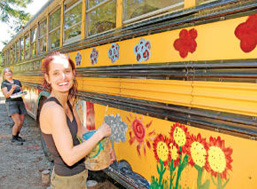Cuba trip receiving local help
- Submitted by: admin
- United States
- Personalities
- 07 / 24 / 2010

Marian Waltz has never been to Cuba, but that doesn’t mean she doesn’t feel kinship with the people there.
She and her husband, Jim Goetsch, manage Fort Wayne’s Friends of the Third World Shoppe, 611 W. Wayne St., which specializes in merchandise made in developing countries, with the aim of helping their people earn a fair wage.
“I would love to be able to sell items from Cuba,” Waltz, 58, says. But because of a long-standing U.S. embargo, Cuban items are off-limits.
So, when the couple, long active in peace causes, heard about another way to aid Cuba’s people, they signed on. Earlier this month they, with the Peace and Justice Committee of Fort Wayne’s Unitarian Universalist Congregation, hosted a local stop of one of eight Friendshipment to Cuba caravans.
The annual aid caravans, in their 21st year, aim to deliver construction, educational and medical supplies to the Caribbean island nation, under Communist rule since 1959.
The caravans are sponsored by the Interreligious Foundation for Community Organization and Pastors for Peace, both based in New York City.
Ellen Bernstein, Pastors for Peace’s associate director, who spoke July 7 during the Fort Wayne event at the Unitarian Universalist Meeting House at 5310 Old Mill Road, says the group is spotlighting what it sees as a failed U.S. policy of isolating Cuba economically.
The embargo, which severely restricts the sale of American products in Cuba and bans U.S. sales of Cuban products and most travel, was put in place after the Cuban missile crisis in the early 1960s.
But the policy hurts both the Cuban people and Americans, she said, adding that Cubans have especially been struggling since the breakup of the Soviet Union, which had been a major trading partner.
She says aid caravans that have been crisscrossing the United States this month were to meet Wednesday in Texas at the U.S.-Mexico border. Organizers were to cross into Mexico so the supplies can be delivered by cargo ship from Tampico, Mexico.
It is illegal to ship goods from the United States to Cuba without a U.S. Treasury license, group officials say, and offenses carry a $50,000 fine. But Pastors for Peace has never been penalized, they say.
Waltz says she and her husband got involved with the group many years ago when it sponsored a partnership of Indiana communities that helped build a medical clinic in Rio San Juan, Nicaragua.
Their aim now is to form an ongoing aid relationship between residents of Fort Wayne and Cuba. About 25 people turned out for the talk and several donated construction supplies and money, she says.
The supplies will be distributed by an association of Christian churches in Cuba, she says.
She and her husband, Jim Goetsch, manage Fort Wayne’s Friends of the Third World Shoppe, 611 W. Wayne St., which specializes in merchandise made in developing countries, with the aim of helping their people earn a fair wage.
“I would love to be able to sell items from Cuba,” Waltz, 58, says. But because of a long-standing U.S. embargo, Cuban items are off-limits.
So, when the couple, long active in peace causes, heard about another way to aid Cuba’s people, they signed on. Earlier this month they, with the Peace and Justice Committee of Fort Wayne’s Unitarian Universalist Congregation, hosted a local stop of one of eight Friendshipment to Cuba caravans.
The annual aid caravans, in their 21st year, aim to deliver construction, educational and medical supplies to the Caribbean island nation, under Communist rule since 1959.
The caravans are sponsored by the Interreligious Foundation for Community Organization and Pastors for Peace, both based in New York City.
Ellen Bernstein, Pastors for Peace’s associate director, who spoke July 7 during the Fort Wayne event at the Unitarian Universalist Meeting House at 5310 Old Mill Road, says the group is spotlighting what it sees as a failed U.S. policy of isolating Cuba economically.
The embargo, which severely restricts the sale of American products in Cuba and bans U.S. sales of Cuban products and most travel, was put in place after the Cuban missile crisis in the early 1960s.
But the policy hurts both the Cuban people and Americans, she said, adding that Cubans have especially been struggling since the breakup of the Soviet Union, which had been a major trading partner.
She says aid caravans that have been crisscrossing the United States this month were to meet Wednesday in Texas at the U.S.-Mexico border. Organizers were to cross into Mexico so the supplies can be delivered by cargo ship from Tampico, Mexico.
It is illegal to ship goods from the United States to Cuba without a U.S. Treasury license, group officials say, and offenses carry a $50,000 fine. But Pastors for Peace has never been penalized, they say.
Waltz says she and her husband got involved with the group many years ago when it sponsored a partnership of Indiana communities that helped build a medical clinic in Rio San Juan, Nicaragua.
Their aim now is to form an ongoing aid relationship between residents of Fort Wayne and Cuba. About 25 people turned out for the talk and several donated construction supplies and money, she says.
The supplies will be distributed by an association of Christian churches in Cuba, she says.
Rosa Salter Rodriguez | The Journal Gazette
source: www.journalgazette.net/
Comments